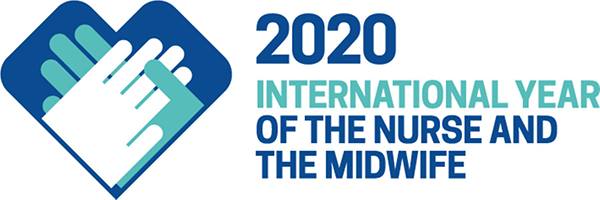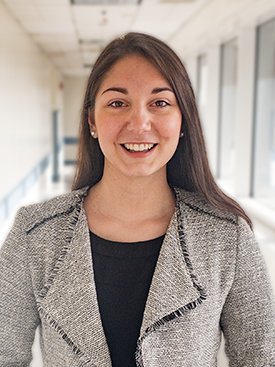College of Nursing
Year of the Nurse & the Midwife:
Top 5 with CON 2020 Jennifer Herrmann
Nursing and midwifery are often thankless professions—still, they remain an undeniably
essential force of the patient’s experience, serving as the critical link or bridge
to the health care they need. Underscoring their invaluable role within the world
of health and medicine, the United Nation’s World Health Organization (WHO) announced
2020 as “The Year of the Nurse and the Midwife.”
The WHO’s recent announcement is part of a larger, international effort to elevate
the nursing and midwifery workforce in the midst of growing global disparities and
shortages in healthcare. The celebratory year highlights an important and determined
objective on the part of the United Nations to identify pathways for universal health
care by 2030.
Nurses and midwives currently comprise more than half of the global workforce in healthcare,
yet data from the WHO show that growing shortages will rise to nearly ten million
over the next decade. With those staggering figures, experts around the world are
looking to nurses and midwives as the most promising and strategically imperative
solution for disease control and the ongoing global maternal and child healthcare
crisis.

To illuminate WHO’s yearlong “Year of the Nurse and the Midwife” campaign and to highlight
the ever-expanding presence and import nurses and midwives bring to the healthcare
table, the College of Nursing and the School of Health Professions’ Midwifery Program
are launching a series of events and communications throughout the year in celebration
of both professions. Having an intimate understanding of the value they add across
settings of care, I’d be remiss if I didn't take this moment to thank the nurses and
midwives who work tirelessly to advance Downstate’s quality of care and patient experience
every day—not to mention our remarkable students matriculating through our competitive
and growing array of nursing and midwifery programs here at Downstate.
To kick things off, I’d like to take a quick look at how an aspiring nurse practitioner
might get started in the field via our Accelerated BS in Nursing Program.
The Accelerated Bachelor of Science in Nursing program is a rigorous 15-month curriculum
that welcomes students from various backgrounds and experiences—allowing us to offer
an accelerated path to a new career in nursing when they’ve previously earned a four-year
degree in a different field. As the curriculum advances, our students are provided
invaluable hands-on experiences via clinical rotations across our academic medical
center and throughout our various healthcare centers. The design of the program allows
for an in-depth exposure to various nursing specialties, including medical and surgical
nursing, obstetrics, pediatrics, psychiatric nursing and community health.
The Accelerated BS in Nursing curriculum approaches the professional development of
its nursing scholars from three essential fundamentals: first establishing a baseline
understanding and theoretical basis for professional nursing practice, then acquiring
the specialized knowledge for the practice of professional nursing, and, finally,
applying that education and developed skills to the practice of nursing across our
clinical settings.
Over the course of four academically-intense semesters, students will acquire leading-edge
education in five foundational areas—health promotion and maintenance; clinical prevention
and population health; organizational and systems leadership; safety and quality improvement
approaches; and patient care related information technology—successfully preparing
them for passage of the National Council Licensing Examination for Registered Nurses
(NCLEX-RN).
As this is the Year of the Nurse, I’d like to shine a light on one of our exemplary
students and future nurses, from the Accelerated BS in Nursing Program—CON Class of
2021 President, Jennifer Herrmann.
Top 5|Q&A with Jennifer Herrmann
2020 Class President, Accelerated BS in Nursing Candidate
 1. Why did you choose to pursue a degree in Nursing? 1. Why did you choose to pursue a degree in Nursing?
I am currently working towards completing my BS in Nursing, which has been a goal
of mine for quite some time. My interest in healthcare broadly dates back to high
school, but I had no prior exposure to any healthcare professions. It really wasn't
until my Junior year in undergrad that I discovered nursing, after being afforded
the opportunity to experience an inpatient oncology unit. I watched the nurses in
this unit wear a number of invaluable hats beyond their clinical roles—they acted
as counselors, friends, family, spiritual advisors—all in an effort to help, support,
encourage, and heal their patients in the most altruistic ways; it was illuminating.
It only took me two weeks to realize I wanted to be a nurse, too, and join a professional
culture that embodies healing from multiple lenses—physically, emotionally and mentally.
It’s been one of the best, most gratifying experiences to date.
2. What does the Nursing profession represent to you?
Prior to enrolling in the Accelerated BS in Nursing, I viewed Nursing as a layer in the healthcare system that serves as a source of
calm and comfort amidst the difficult and chaotic times that patients may experience
at the point of care.
While I still think that, I have also learned that the Nursing profession is so much
more. Nursing represents kindness and compassion in the healthcare industry. It emphasizes
patient-centered care and unity amongst providers. Nurses are communicators, leaders,
healers, confidants, advocates; they are the grounding members of the healthcare team
who prioritize and honor their responsibility to their patients in all aspects of
health and well-being. The Nursing profession bridges the gap between patient and
provider, always acknowledging the humanity that is required to provide the best care
possible.
3. What compelled you to earn your Nursing degree at SUNY Downstate?
Downstate serves a community of people that come from some of the most vibrant cultures
and backgrounds, while also representing communities that have historically been afforded
less than equal or optimal care resulting in grave health disparities for these populations.
As a future healthcare practitioner, I knew learning at Downstate would be a rare
and invaluable opportunity to expand my knowledge and understanding of these communities
so that I may be a well-informed advocate for equitable care for every community.
Choosing SUNY Downstate meant being a part of the effort to make care more accessible
for communities in need, and that choice was very easy. I have been lucky enough
to experience how effective good healthcare can be and I have dedicated my degree
and my clinical experiences to bringing that quality of care here to residents across
Central Brooklyn.
4. Tell us about your experience in the program thus far?
It has been a whirlwind! The Accelerated BS in Nursing program is rigorous, and very quick. I have learned a lot about being an agent of
my own education, as well as how to be an advocate for movements greater than my own
individual pursuits. All incredible lessons for a nurse-in-training!
This program has also given me the opportunity to delve into the topic of diversity,
not only as it pertains to different cultures but also as it pertains to different
racial identities, gender identities, sexual identities, and more. We have been taught
how to be better communicators and better listeners—an enriching benefit not only
to our professional careers, but also to our personal lives. The opportunity to change
and grow has been endless. I am so beyond thankful to our campus leadership, to devoted
faculty, and to my awesome peers for every moment… it has been an incredible ride.
The opportunity to serve as Class President has also been an inspiring, humbling experience. The
Nursing Student Council is composed of seven other incredible women who make everything
we do possible through their creativity, passion, and spirit. We, as a Council, work
on providing educational opportunities, service opportunities, and social opportunities
for the students in the College of Nursing. But in addition to that, as President,
I have made my personal mission increasing and improving the role of the Council and
the nursing students at SUNY Downstate. We comprise only a small piece of the student
body, but we have a lot to offer so I actively seek out and embrace opportunities
to represent the Council and the college so that the nursing perspective can be heard
and appreciated.
5. What do you plan to do/pursue after you complete your program?
First on the list is to take and pass the NCLEX, of course, but after that I would
love to travel a bit before settling into my first nursing job. I am very excited
to be an RN, but I also want to see the world so I’m hoping to make both of those
things happen. After that I will be ready to take everything SUNY Downstate has taught
me and turn it into the rest of my life!
---
I’d like to take this opportunity to thank Ms. Herrmann for giving us an inside-look
into her experience as a student in the Accelerated BS in Nursing program. I’d also
like to express my gratitude to all of our students across our various nursing and
midwifery programs for joining a profession steeped in selfless humanity. Your sacrifice
as students today is a promise of continued healing for the world around us, and I
thank you for that.
|